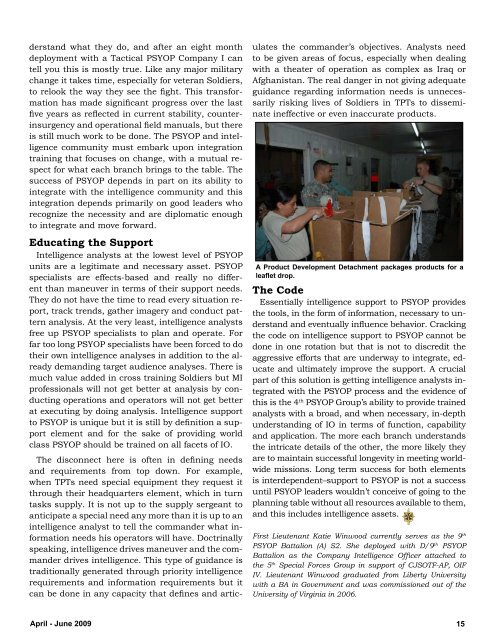Military Intelligence Professional Bulletin - Federation of American ...
Military Intelligence Professional Bulletin - Federation of American ...
Military Intelligence Professional Bulletin - Federation of American ...
Create successful ePaper yourself
Turn your PDF publications into a flip-book with our unique Google optimized e-Paper software.
derstand what they do, and after an eight month<br />
deployment with a Tactical PSYOP Company I can<br />
tell you this is mostly true. Like any major military<br />
change it takes time, especially for veteran Soldiers,<br />
to relook the way they see the fight. This transformation<br />
has made significant progress over the last<br />
five years as reflected in current stability, counterinsurgency<br />
and operational field manuals, but there<br />
is still much work to be done. The PSYOP and intelligence<br />
community must embark upon integration<br />
training that focuses on change, with a mutual respect<br />
for what each branch brings to the table. The<br />
success <strong>of</strong> PSYOP depends in part on its ability to<br />
integrate with the intelligence community and this<br />
integration depends primarily on good leaders who<br />
recognize the necessity and are diplomatic enough<br />
to integrate and move forward.<br />
Educating the Support<br />
<strong>Intelligence</strong> analysts at the lowest level <strong>of</strong> PSYOP<br />
units are a legitimate and necessary asset. PSYOP<br />
specialists are effects-based and really no different<br />
than maneuver in terms <strong>of</strong> their support needs.<br />
They do not have the time to read every situation report,<br />
track trends, gather imagery and conduct pattern<br />
analysis. At the very least, intelligence analysts<br />
free up PSYOP specialists to plan and operate. For<br />
far too long PSYOP specialists have been forced to do<br />
their own intelligence analyses in addition to the already<br />
demanding target audience analyses. There is<br />
much value added in cross training Soldiers but MI<br />
pr<strong>of</strong>essionals will not get better at analysis by conducting<br />
operations and operators will not get better<br />
at executing by doing analysis. <strong>Intelligence</strong> support<br />
to PSYOP is unique but it is still by definition a support<br />
element and for the sake <strong>of</strong> providing world<br />
class PSYOP should be trained on all facets <strong>of</strong> IO.<br />
The disconnect here is <strong>of</strong>ten in defining needs<br />
and requirements from top down. For example,<br />
when TPTs need special equipment they request it<br />
through their headquarters element, which in turn<br />
tasks supply. It is not up to the supply sergeant to<br />
anticipate a special need any more than it is up to an<br />
intelligence analyst to tell the commander what information<br />
needs his operators will have. Doctrinally<br />
speaking, intelligence drives maneuver and the commander<br />
drives intelligence. This type <strong>of</strong> guidance is<br />
traditionally generated through priority intelligence<br />
requirements and information requirements but it<br />
can be done in any capacity that defines and artic-<br />
ulates the commander’s objectives. Analysts need<br />
to be given areas <strong>of</strong> focus, especially when dealing<br />
with a theater <strong>of</strong> operation as complex as Iraq or<br />
Afghanistan. The real danger in not giving adequate<br />
guidance regarding information needs is unnecessarily<br />
risking lives <strong>of</strong> Soldiers in TPTs to disseminate<br />
ineffective or even inaccurate products.<br />
A Product Development Detachment packages products for a<br />
leaflet drop.<br />
The Code<br />
Essentially intelligence support to PSYOP provides<br />
the tools, in the form <strong>of</strong> information, necessary to understand<br />
and eventually influence behavior. Cracking<br />
the code on intelligence support to PSYOP cannot be<br />
done in one rotation but that is not to discredit the<br />
aggressive efforts that are underway to integrate, educate<br />
and ultimately improve the support. A crucial<br />
part <strong>of</strong> this solution is getting intelligence analysts integrated<br />
with the PSYOP process and the evidence <strong>of</strong><br />
this is the 4 th PSYOP Group’s ability to provide trained<br />
analysts with a broad, and when necessary, in-depth<br />
understanding <strong>of</strong> IO in terms <strong>of</strong> function, capability<br />
and application. The more each branch understands<br />
the intricate details <strong>of</strong> the other, the more likely they<br />
are to maintain successful longevity in meeting worldwide<br />
missions. Long term success for both elements<br />
is interdependent–support to PSYOP is not a success<br />
until PSYOP leaders wouldn’t conceive <strong>of</strong> going to the<br />
planning table without all resources available to them,<br />
and this includes intelligence assets.<br />
First Lieutenant Katie Winwood currently serves as the 9 th<br />
PSYOP Battalion (A) S2. She deployed with D/9 th PSYOP<br />
Battalion as the Company <strong>Intelligence</strong> Officer attached to<br />
the 5 th Special Forces Group in support <strong>of</strong> CJSOTF-AP, OIF<br />
IV. Lieutenant Winwood graduated from Liberty University<br />
with a BA in Government and was commissioned out <strong>of</strong> the<br />
University <strong>of</strong> Virginia in 2006.<br />
April - June 2009 15
















